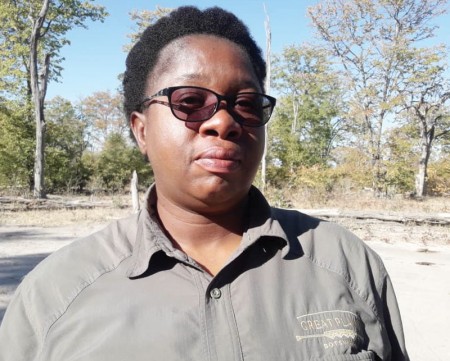A woman at the frontline of conservation
Staff Writer | Friday August 16, 2019 13:47


Blessed with some of the greatest wildlife spectacles on earth, Botswana is amongst the top safari destinations in Africa. It is not surprising therefore that Oratile Beula developed a passion for the country’s fauna and flora at a young age.
Women game rangers are still something of a novelty in the male-dominated safari industry. But 38-year-old Beula, fondly known as Rati, is a trailblazer. She is the first female guide at Great Plains Conservation – which operates luxury game lodges in Botswana, Zimbabwe and Kenya – and one of only a handful in Botswana.
“I fell in love with the bush when I was still at school,” she says. “I also enjoy working with people, so a career in conservation tourism was a perfect fit.” Having completed her studies at the Botswana Wildlife Training Institute in 2006, where she learnt wildlife conservation and professional tour guiding, she also did a course in basic vehicle maintenance and service, something which would stand her in good stead in the future.
Recently, she gained a Trails Guiding qualification from Okavango Guiding School, which includes rifle handling. Beula has a keen interest in cultural heritage and is always happy to share her knowledge with guests.
“Watching animals from a distance is quite different from getting up close to them,” Beula laughs. “It required quite a mind shift in the beginning, but the more I understood their behaviour and their value to the country, the more hooked I became and the more convinced I was that I had made the right choice.”
Beula cut her guiding teeth at the ecotourism-certified Chobe Game Lodge, where she worked as a professional tour guide from 2008 to 2015. The elegant, five-star, safari lodge located inside the world-renowned Chobe National Park proved to be a fertile training ground for the young ranger, who learnt to share her passion and explore the diversity of Chobe National Park with visitors from all over the world. After that, she did a stint at budget safari operator Kalahari Tours and the small group specialist Jenman Africa Safaris. A true wildlife enthusiast, she loves all animals, but elephants are her favourite. “I’m crazy about them,” she says. “Their behaviour is different from that of other mammals. There is something so human about elephants. “Research has shown that they are some of the most intelligent, social, and empathic animals in the world, and they engage in a variety of behaviours that are startlingly similar to our own. “I’m always eager to learn more about these fascinating giants.” Joining Great Plains Conservation was a prudent career move. The organisation focuses on conservation and the wellbeing of communities, and how the two work hand-in-hand. The company employs almost 300 people and supports thousands of community members as a result. Great Plains has also invested extensively in women empowerment initiatives and has created many opportunities to empower women like Beula via proceeds from the tourism industry. Through the Great Plains Foundation, for example, a group of nine women from five communities in the Okavango Delta will be going to India to learn about solar technology at the Barefoot College in Rajasthan.
The programme gives rural people practical knowledge and skills in electrification through solar power. On their return, the women will be able to facilitate the electrification of their villages, helping to put an end to the use of candles and paraffin lanterns, which often lead to terrible fires. “As a beneficiary of Great Plains’ drive to empower women, I am grateful for the support I have received in my goal to become an expert in conservation and tourism specialist,” says Beula.
“Our management team is always encouraging and motivating me to do more.” On being one of the few women in her field, Beula says it makes her feel special. “I guess I’m quite unique. It was difficult in the beginning to be a female guide in a male environment, but I’m used to it now. The industry is changing too, and while women used to be pushed into admin or management, more and more of us are going into guiding and people are realising that we know what we are doing. My colleagues have been really supportive and mostly have made my experience enjoyable.” Becoming a game ranger requires a versatile skill set.
To those of us on the outside, it seems like a glamorous career. After all, what could be more fun than socialising, driving rugged outdoor vehicles and tracking wildlife in the world’s most unspoiled reserves, right? There’s actually a lot more to the job, including admin, ongoing learning, and waking up at the crack of dawn to prep for the day. Beula’s morning starts at around 4.30am. She wakes the lodge guests up with coffee and they set out on their first game drive at 6.30am.
They return to camp at 11.00am for brunch, and that is when she takes a break and catches up on her other duties. Guests are taken out for their night drive in the afternoon and return at 7.30pm for dinner. If there is no moon, stargazing happens later in the evening, an activity that Rati thoroughly enjoys.
By 11.00pm she is in bed with a book, usually on a conservation related topic. She is also learning German, so her day is certainly packed. “The key ingredient to becoming a ranger is passion,” says Beula. “You need to be passionate about people, the environment and about wildlife. The ability to think on your feet is helpful.” Although her family and the people back home do not know that much about tourism, Beula says they are always interested in knowing what she has been up to.
*Monique Verduyn is a writer based in Johannesburg (South Africa). She writes on a wide range of topics, including leadership, technology, entrepreneurship, and entertainment. Her work is published in many of the country’s top publications.
